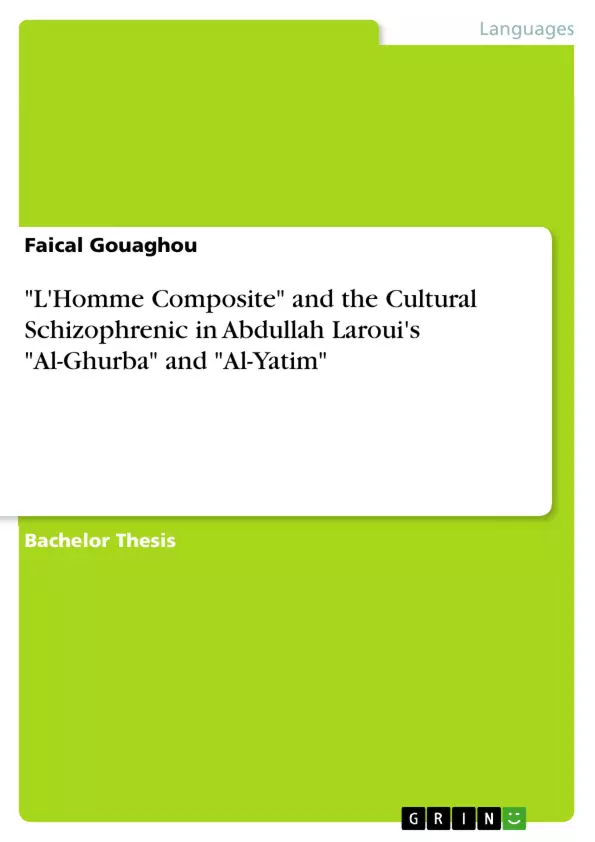Moroccan society is composed of many conflicting and/or correlating modes of production. The subject, by virtue of inhabiting such a ‘composite’ society, is racked under the burdensomeness of modes of production. The inability to identify wholly with one pole of meaning production causes ‘l’homme composite de la société composite’ a certain split. Darius Shayegan calls such a split ‘cultural schizophrenia.’ This paper attempts to trace cultural schizophrenia and its consequences on ‘l’homme composite’ in two novels by Abdullah Laroui “Al-Ghurba” [Alienation] and “Al-Yatim” [The Orphan]. The study of modes of production in Moroccan society, as the two novels depict, will give the paper an important insight into characters’ schizophrenic behaviour.
This paper is anchored on the idea that some characters are schizophrenic in the sense that they exhibit certain schizophrenic behaviours.
I mean by cultural schizophrenia that the characters are ‘culturally’ schizophrenic; that is, they display manifold facets of modes of consciousness that go hand in hand with certain modes of social organization and cultural production. This state generates feelings of alienation. I believe this cultural schizophrenia is the consequence of the conflicting dualisms that characterize these people who inhabit ‘les sociétés composites.’
Inhaltsverzeichnis (Table of Contents)
- General Introduction
- «L'homme Composite» and the Cultural Schizophrenic
- «La Société Composite» in Al-Ghurba and Al-Yatim
- Patriarchy
- From Feudalism to Capitalism
- Tribalism
- Morbid Symptoms
- Double reference
- The return of the repressed as a morbid symptom
- Alienation as a morbid symptom: powerlessness and meaninglessness
- Powerlessness
- Meaninglessness and normlessness
- The Narrative Space in Al-Ghurba
- Rooms
- City
- General Conclusion
- Works Cited
Zielsetzung und Themenschwerpunkte (Objectives and Key Themes)
This research paper aims to analyze the concept of "l'homme composite" and its connection to cultural schizophrenia in two novels by Abdullah Laroui, Al-Ghurba [Alienation] and Al-Yatim [The Orphan]. The paper explores how the complex and conflicting modes of production in Moroccan society contribute to the psychological fragmentation of individuals who are unable to fully identify with any single cultural identity.
- The concept of "l'homme composite" and its manifestation in Moroccan society
- The role of cultural schizophrenia in shaping the individual's experience
- The influence of conflicting modes of production on the psychological state of individuals
- The narrative techniques employed by Laroui to portray the characters' internal conflicts and experiences
- The impact of alienation and powerlessness on the characters' lives and perspectives
Zusammenfassung der Kapitel (Chapter Summaries)
The paper begins with an introduction that establishes the context for the analysis. It then delves into the concept of "l'homme composite" and its connection to cultural schizophrenia, examining how these concepts manifest in Laroui's novels. The paper explores various aspects of Moroccan society, including patriarchy, feudalism, capitalism, and tribalism, and analyzes how these social structures contribute to the psychological fragmentation of individuals.
The paper then examines the concept of "morbid symptoms" and how they relate to cultural schizophrenia. This section explores the themes of double reference, the return of the repressed, and alienation. The paper analyzes how these symptoms manifest in the characters' behavior and experiences. The final section of the paper focuses on the narrative space in Al-Ghurba, examining how the novel's spatial elements contribute to the overall themes of alienation and fragmentation.
Schlüsselwörter (Keywords)
The key terms and concepts explored in this paper include "l'homme composite," cultural schizophrenia, Moroccan society, modes of production, alienation, powerlessness, meaninglessness, narrative space, and the novels Al-Ghurba and Al-Yatim.
Frequently Asked Questions
What does "cultural schizophrenia" mean in the context of Moroccan society?
It refers to the split identity of individuals living in a "composite society" where conflicting modes of production (patriarchy, feudalism, capitalism) coexist.
Who is Abdullah Laroui?
Abdullah Laroui is a Moroccan author whose novels, such as "Al-Ghurba" and "Al-Yatim," explore themes of alienation and social fragmentation.
What are "morbid symptoms" in Laroui's novels?
These are psychological manifestations like powerlessness, meaninglessness, and double references caused by cultural schizophrenia.
How is narrative space used in "Al-Ghurba"?
The novel uses specific spaces like rooms and the city to symbolize the characters' internal state of alienation and fragmentation.
What is "l'homme composite"?
It is the individual who inhabits a composite society and is torn between different cultural and social production modes, leading to a fragmented self.
- Arbeit zitieren
- Faical Gouaghou (Autor:in), 2014, "L'Homme Composite" and the Cultural Schizophrenic in Abdullah Laroui's "Al-Ghurba" and "Al-Yatim", München, GRIN Verlag, https://www.grin.com/document/299497



